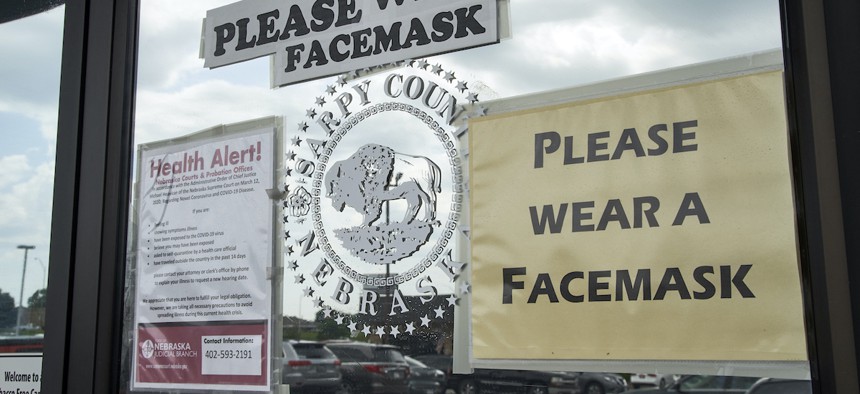Uncovering the 'Next Normal:' A Survey for Local Government Officials on the Effects of Covid-19

Signs encourage the wearing of face masks Thursday, June 18, 2020, at a Sarpy County office in Papillion, Neb., where face covering is recommended but not mandatory. Associated Press
A new survey is asking local government workers and officials about how the pandemic has affected services, technology, team dynamics and more.
The Covid-19 pandemic forced local government officials to quickly pivot their operations—facilitating remote work, changing the way staffers interact with residents and utilizing technology to deliver a host of municipal services that are normally handled in person.
Will those changes be permanent? What’s worked for local governments, and what hasn’t? And what happens next? The “Next Normal Survey,” a joint effort between three organizations that work with local governments, aims to find out.
“Our mission has always been to basically help cities build better stuff more quickly by providing them with actionable information,” said Elle Hempen, co-founder of the Atlas, an online community designed to help local governments trade information and ideas on successful projects and strategies. “We traditionally have done that in the form of case studies, but it seemed like this was such an unknown situation, and the best and most useful way to uncover how things might be changing in work and public service seemed to be a survey.”
The survey, released Wednesday by the Atlas, ELGL and SeeClickFix, aims to gather information from local government officials and staff about how things have changed in the past six months and how they might continue to evolve.
Questions, broken into five sections, focus on priorities (what were the top issues your government was focused on three to five months ago, and what are those issues now?), the impact of Covid-19 (have team dynamics changed? How have you shifted the way you deliver services?) and the utilization of new technology and software, as well as predictions for the future (are there positive things cities can take from the pandemic? Are you in the process of preparing for similar events in the future?).
Completing the survey should take 10 minutes or less. It runs through July 7 and will be delivered via email to each organization’s membership, but any local government official can participate, Hempen said. Results will be released publicly, likely at the end of July, with the goal of helping cities understand the widespread impact of the pandemic.
“Our intention is really to understand how priorities and pain points have changed because of Covid, and whether some of the shifts we’re seeing, particularly with adoption of new technology, might be permanent,” Hempen said. “We think it’s the the type of information that can help cities understand where their peers are and where other cities are so they can feel empowered to make smart decisions. Because they’re not alone in this.”
Kate Elizabeth Queram is a staff correspondent for Route Fifty and is based in Washington, D.C.
NEXT STORY: Federal Officials Detail Preparations for 'Inevitable' Coronavirus Surge This Fall





